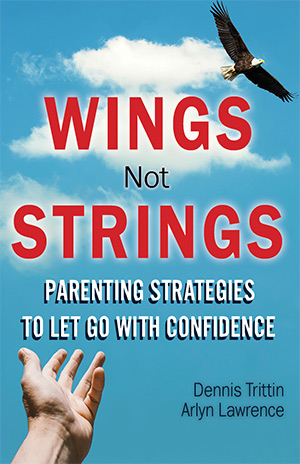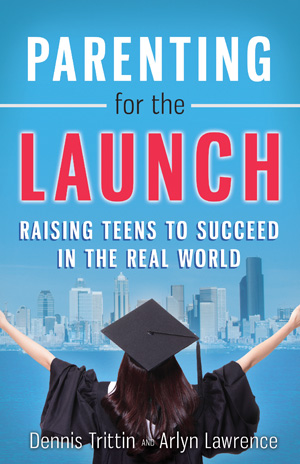Will We Ever Let Them Go: Part Three
10/3/2016 11:54:04 PM
Our nation’s colleges and universities have a powerful, two-fold influence on preparing young adults for life success. On one hand, they play a role as receiver of our high school graduates. On the other hand, after four plus years of educational effort, they serve as senders of their graduates to employers, communities, and independent life. They’re rather like the third leg of the relay race from parents to schools to colleges to employers.
The implications of this positioning are profound. College educators, via their admissions criteria, have an enormous influence on the high school agenda, especially in the area of course requirements. They are the proverbial tail wagging the dog when it comes to high school academic programs. Frankly, I believe this is an undue, and not always beneficial, influence. Academicians, who often lack work experience outside of the classroom, are setting the agenda. Based on their actions, they seem to undervalue practical leadership/life skills training (e.g., personal finance) that is so relevant to students. Otherwise you’d see these courses reflected in their admission requirements! Not surprisingly, high schools design their course menus to satisfy the demands of colleges. That’s an issue. I would argue, a big issue.
Secondly, college course offerings and their own graduation requirements are often lacking in practical life training. Rather, their first few years emphasize traditional academic subjects that are often redundant from high school, and irrelevant to life after college for many students. In other words, college course requirements appear disconnected from their role in preparing students for independent living. This is also a big issue.
Thirdly, colleges are often shortchanging students in the area of employability and job acquisition. Despite their massive investment, students are not always required to take career readiness and job search courses to help them achieve a positive return on their college experience. Today’s graduates are increasingly ill prepared to navigate today’s recruitment process. If colleges aren’t accountable for this training, who is?
Several of my recommendations to colleges echo what I shared in my thoughts for high schools. However, because of the unique positioning of our colleges in preparing young adults for real life, others are specifically directed toward them.
- 1. Apply my points 1-3 and 5-7 from the secondary school educators’ recommendation list to your college/university institution. Unlike the high school setting, the next step for most college graduates is a well-suited career. Accordingly, this should have significant ramifications on college programs, rather than predominantly focusing on academics for academics’ sake. However, based on employer feedback, this is not generally the case. I encourage colleges to allow employers to command a voice on this topic to do a better job of representing the end users receiving your graduates. Invite them to share in your classrooms—to offer valuable perspectives outside of the academic bubble. Most importantly, solicit their views on what constitutes a well prepared graduate for life and reflect their perspectives in your program. Just as your views are influencing the secondary school agenda, so should employers be influencing yours.
- 2. Focus more on leadership and life-relevant training and (comparatively) less on redundant core requirements that are often found in high school. While a broad-based educational foundation is important, far too much of the college experience (and dollar!) is devoted to courses that are simply not as relevant or practically beneficial to students. The opportunity cost is too great.
- 3. Completely revisit the academic admissions requirements imposed on our high schools. Aside from a base of core academics, it would better serve all students to incorporate leadership and practical life training to a greater degree. (Does anyone really believe that a two-to-three-year foreign language requirement for high school students is more important to life than financial literacy?!? Yet, the former is usually required, and we’re silent on the latter.)
- 4. Assume greater accountability for student career success. All colleges and universities should be required provide success measures of their graduates in landing a job (both within and outside of their major). This would not only be beneficial to families in the college search process, but it would also help students in selecting their major. (Wouldn’t it be helpful to know the percent of students who landed a job in each major?) Also, students should be required to take a comprehensive career-readiness course involving career exploration, qualification, marketing, and excelling. With the lack of jobs for youth and young adults, many are entering the workforce extremely green. All colleges should seek partnerships with area businesses to offer students real-world perspectives, internships, and recruitment for future jobs. The bottom line: colleges need to take more ownership in providing graduates with a significant return on their sizable investment.
- 5. Dispense with the political correctness, safe spaces, trigger warnings, segregated dorms, and disrespectful guest speaker treatment/disinvitations. These efforts merely delay students’ ability to relate/communicate with others, resolve conflict, problem solve, handle adversity, and respectfully consider differing views and perspectives. Unfortunately, this heightened form of coddling has become routine on campuses, and it will only inhibit your students’ ability to navigate life. (Thank you Dr. John Edison, Dean of Students at the University of Chicago, for your example.)
I truly believe that if we all made a conscious and concerted effort to make some changes, we would see the next generation thrive. Isn’t that something we all want to see?
You can access parts one and two of this series here and here, or, you can read the full article in our resource center.
Tagged as: millennials, series, success, college, academics, teachers, educators, life perspective, what i wish i knew at 18



















